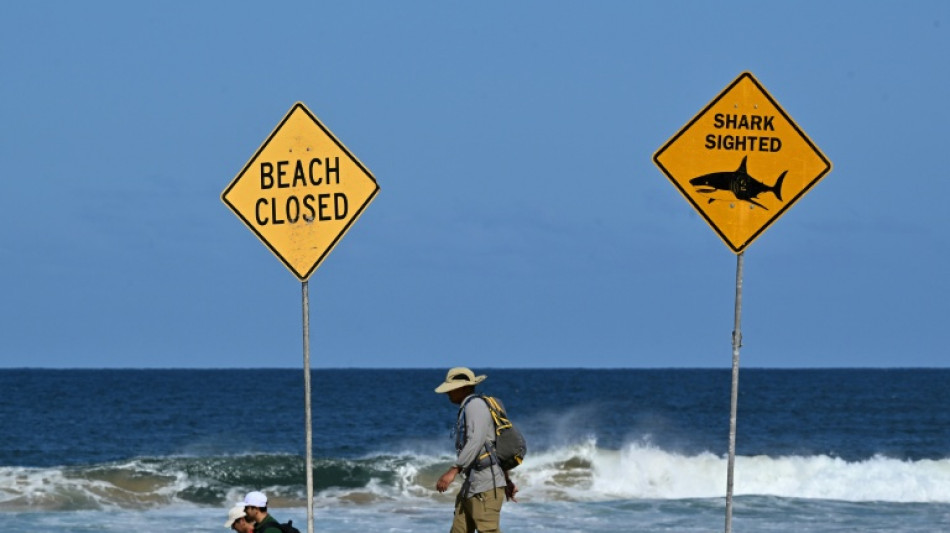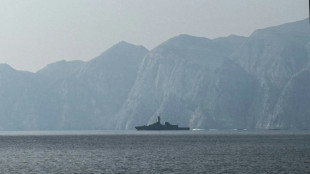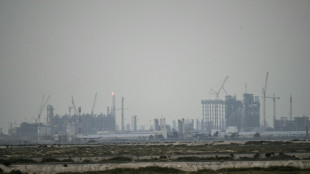
-
 Bayern and Kane gambling with house money as Gladbach come to town
Bayern and Kane gambling with house money as Gladbach come to town
-
Turkey invests in foreign legion to deliver LA Olympics gold

-
 Galthie's France blessed with unprecedented talent: Saint-Andre
Galthie's France blessed with unprecedented talent: Saint-Andre
-
Voice coach to the stars says Aussie actors nail tricky accents

-
 Rahm rejection of DP World Tour deal 'a shame' - McIlroy
Rahm rejection of DP World Tour deal 'a shame' - McIlroy
-
Israel keeps up Lebanon strikes as ground forces advance

-
 China prioritises energy and diplomacy over Iran support
China prioritises energy and diplomacy over Iran support
-
Canada PM Carney says can't rule out military participation in Iran war

-
 Verstappen says new Red Bull car gave him 'goosebumps'
Verstappen says new Red Bull car gave him 'goosebumps'
-
Swiss to vote on creating giant 'climate fund'

-
 Google to open German centre for 'AI development'
Google to open German centre for 'AI development'
-
Winter Paralympics to start with icy blast as Ukraine lead ceremony boycott

-
 Sci-fi without AI: Oscar nominated 'Arco' director prefers human touch
Sci-fi without AI: Oscar nominated 'Arco' director prefers human touch
-
Ex-guerrillas battle low support in Colombia election

-
 'She's coming back': Djokovic predicts Serena return
'She's coming back': Djokovic predicts Serena return
-
Hamilton vows 'no holding back' in his 20th Formula One season

-
 Two-thirds of Cuba, including Havana, hit by blackout
Two-thirds of Cuba, including Havana, hit by blackout
-
US sinks Iranian warship off Sri Lanka as war spreads

-
 After oil, US moves to secure access to Venezuelan minerals
After oil, US moves to secure access to Venezuelan minerals
-
Arteta hits back at Brighton criticism after Arsenal boost title bid

-
 Carrick says 'defeat hurts' after first loss as Man Utd boss
Carrick says 'defeat hurts' after first loss as Man Utd boss
-
Ecuador expels Cuba envoy, rest of mission

-
 Arsenal stretch lead at top of Premier League as Man City falter
Arsenal stretch lead at top of Premier League as Man City falter
-
Title race not over vows Guardiola after Man City held by Forest

-
 Rosenior hails 'world class' Joao Pedro after hat-trick crushes Villa
Rosenior hails 'world class' Joao Pedro after hat-trick crushes Villa
-
Brazil ratifies EU-Mercosur trade deal

-
 Real Sociedad edge rivals Athletic to reach Copa del Rey final
Real Sociedad edge rivals Athletic to reach Copa del Rey final
-
Chelsea boost top four push as Joao Pedro treble routs Villa

-
 Leverkusen sink Hamburg to keep in touch with top four
Leverkusen sink Hamburg to keep in touch with top four
-
Love match: WTA No. 1 Sabalenka announces engagement

-
 Man City falter as Premier League leaders Arsenal go seven points clear
Man City falter as Premier League leaders Arsenal go seven points clear
-
Man City title bid rocked by Forest draw

-
 Defending champ Draper ready to ramp up return at Indian Wells
Defending champ Draper ready to ramp up return at Indian Wells
-
Arsenal extend lead in title race after Saka sinks Brighton

-
 US, European stocks rise as oil prices steady; Asian indexes tumble
US, European stocks rise as oil prices steady; Asian indexes tumble
-
Trump rates Iran war as '15 out of 10'

-
 Nepal votes in key post-uprising polls
Nepal votes in key post-uprising polls
-
US Fed warns 'economic uncertainty' weighing on consumers

-
 Florida family sues Google after AI chatbot allegedly coached suicide
Florida family sues Google after AI chatbot allegedly coached suicide
-
Alcaraz unbeaten run under threat from Sinner, Djokovic at Indian Wells

-
 Iran's supreme leader gone, but opposition still at war with itself
Iran's supreme leader gone, but opposition still at war with itself
-
Mideast war rekindles European fears over soaring gas prices

-
 'Miracle to walk' says golfer after lift shaft fall
'Miracle to walk' says golfer after lift shaft fall
-
'Nothing is working': Gulf travel turmoil hits Berlin tourism fair

-
 Harvey Weinstein rape retrial to start April 14: publicist
Harvey Weinstein rape retrial to start April 14: publicist
-
No choke but 'walloping', South Africa coach says of T20 flop

-
 Bayer gets preliminary approval for weedkiller class settlement
Bayer gets preliminary approval for weedkiller class settlement
-
Russia to free two Hungarian-Ukrainian POWs, Putin says

-
 Michelangelo's works hidden in 'secret room', researcher says
Michelangelo's works hidden in 'secret room', researcher says
-
Adidas shares slump on outlook, Mideast war casts shadow


Australia fends off shark bites with new tech and old
High above Sydney's beaches, drones seek one of the world's deadliest predators, scanning for the flick of a tail, the swish of a fin or a shadow slipping through the swell.
Australia's oceans are teeming with sharks, with great whites topping the list of species that might fatally chomp a human.
Undeterred, Australians flock to the sea in huge numbers -- with a 2024 survey showing nearly two-thirds of the population made a total of 650 million coastal visits in a single year.
Many beach lovers accept the risks.
When a shark killed surfer Mercury Psillakis off a northern Sydney beach in September, his grief-stricken family called it "a tragic and unavoidable accident".
Increasingly crowded waters and rising ocean temperatures that appear to be swaying sharks' migratory patterns may be contributing to an escalation in attacks despite overfishing depleting some species, scientists say.
More than 1,280 shark incidents have been recorded around Australia since 1791 -- about 260 of them fatal -- according to a national database.
Though still relatively rare, fatal attacks do appear to be on the rise with 56 reported deaths in the 25 years to 2025, compared to 27 deaths in the previous quarter-century.
- Shepherding sharks -
But how best to protect people from sharks is a sensitive topic in Australia.
Authorities have adopted a multi-layered approach -- deploying drones, fixing acoustic trackers to sharks so they can be detected by listening buoys near popular beaches, alerting people in real time with a mobile app, and stringing up old-fashioned nets.
Drones have become a key resource, spotting more than 1,000 of the predators in the past year as they prowled New South Wales coastal waters.
"We err on the side of caution," Surf Life Saving New South Wales drone pilot Oliver Heys told AFP.
"If we see something, we drop down and zoom in to see if it is a dangerous shark or not," he said.
"When we see them, a jet ski or inflatable rescue boat shepherds the shark back out to sea."
Pilots look for three species considered the most dangerous: great whites, tiger sharks and bull sharks.
Of these, the great white has accounted for 42 percent of shark attacks since 2000.
- 'Dinner bell' -
While shark nets are rolled out each summer in New South Wales and Queensland, their use is hotly debated.
Three local councils in New South Wales planned to remove the nets from some beaches in a trial this year, but scotched the move after September's fatal attack in Sydney.
Support for nets, which can be wider than a football field and up to six metres (20 feet) deep, has also broadly waned because sharks can swim around them, and the mesh kills most of the marine life it ensnares, including endangered turtles, dolphins, fish and rays.
Nets are outdated and can act as a "dinner bell" when trapped carcasses attract the predators, Leonardo Guida, shark scientist at the Australian Marine Conservation Society, told AFP.
Many scientists advocate more sophisticated techniques.
In New South Wales, smart drumlines -- anchored buoys with baited hooks -- send an alert when a shark bites, allowing the animals to be tagged.
A mobile app called Shark Smart then alerts swimmers, surfers, divers and fishers in real time when a tagged shark nears a listening buoy off their favourite beaches.
But the technology only works if the aquatic hunter has been tagged or swims near a buoy that can detect it.
Other Australian states rely on wall-like structures that enclose headlands to protect swimmers.
"There is no silver bullet," Guida said.
"We are not going to eliminate 100 percent of the risk," he added.
"But we can mitigate that risk as much as possible."
- Bite-resistant wetsuits -
Scientists are also trying to make shark encounters less deadly with measures such as bite-resistant materials and electronic deterrents.
Some bite-resistant wetsuits may reduce injuries and blood loss, the most common cause of death from shark bite, according to New South Wales-funded research by Flinders University professor Charlie Huveneers and his team.
Huveneers' previous research also found that an effective personal electronic device designed to repel sharks by interfering with their electro-sensory systems may reduce bites by about 60 percent.
"Australia is at the forefront of shark bite mitigation measures," he said.
"We can actually save lives."
Researchers say shark lives, too, need protecting.
Globally, about 37 percent of oceanic shark and ray species are now listed as either endangered or critically endangered by the International Union for Conservation of Nature, a global database for threatened species.
And while sharks may instil trepidation in Australia's waters, official data shows drowning is a far bigger risk, killing 357 people in the 12 months to June this year.
M.Betschart--VB




